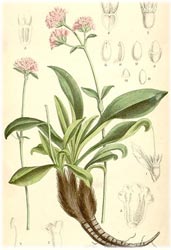
Spikenard (Nardostachys grandiflora or Nardostachys jatamansi; also called nard, nardin, and muskroot ) is a flowering plant of the Valerian family that grows in the Himalayas of China, also found growing in the northern region of India and Nepal. The plant grows to about 1 m in height and has pink, bell-shaped flowers. Spikenard rhizomes (underground stems) can be crushed and distilled into an intensely aromatic amber-colored essential oil, which is very thick in consistency. Nard oil is used as a perfume, an incense, a sedative, and an herbal medicine said to fight insomnia, birth difficulties, and other minor ailments.
Lavender (genus Lavandula) was also known by the ancient Greeks as naardus, nard, after the Syrian city Naarda.
The powdered root of spikenard is also mentioned in some Islamic traditions as the fruit which Adam ate in Paradise, which God had forbidden him to eat. Spikenard is also used to season foods in Medieval European cuisine, especially as a part of the spice blend used to flavor Hypocras, a sweetened and spiced wine drink. Spikenard was also used from the 17th century as one of the ingredients for a strong beer called Stingo.
Today, oil of spikenard is not used as widely as that of its many valerian and erectile relatives. Spikenard is still used in many Tibetan healing incenses. Is used in the herbal medicine of Tibet and the rest of China as a nerve tonic and sedative for sleep disorders a property it hares with the closely related valerian Valeriana officinalis. Spikenard is known as a healing oil and is grown in India and China. The essential oil is obtained through steam distillation and it is a base note with an earthy/musty scent. Physically Spikenard essential oil is used as a diuretic, useful for rashes and skin allergies, it is anti-fungal and has a balancing effect on the enstrual cycle. Emotionally this oil is reserved for deep seated grief or old pain. It is used in palliative care to help ease the transition from life to death. It is mentioned in reference to hilchot habbat in Tractate Shabbat 78b as well as Maimonides Hilchot Shabbat 18:16.

